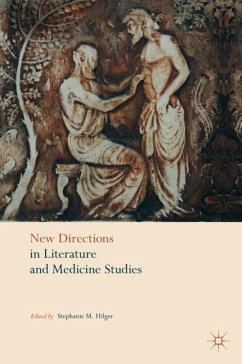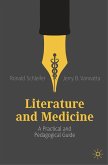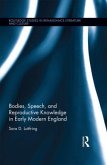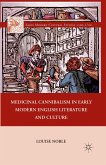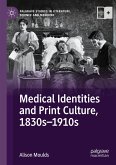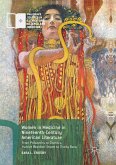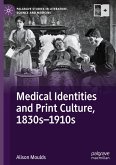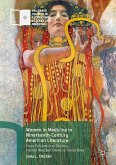New Directions in Literature and Medicine Studies
Herausgegeben:Hilger, Stephanie M.
New Directions in Literature and Medicine Studies
Herausgegeben:Hilger, Stephanie M.
- Gebundenes Buch
- Merkliste
- Auf die Merkliste
- Bewerten Bewerten
- Teilen
- Produkt teilen
- Produkterinnerung
- Produkterinnerung
This book is situated in the field of medical humanities, and the articles continue the dialogue between the disciplines of literature and medicine that was initiated in the 1970s and has continued with ebbs and flows since then. Recently, the need to renew that interdisciplinary dialogue between these two fields, which are both concerned with the human condition, has resurfaced in the face of institutional challenges, such as shrinking resources and the disappearance of many spaces devoted to the exchange of ideas between humanists and scientists. This volume presents cutting-edge research by…mehr
Andere Kunden interessierten sich auch für
![Literature and Medicine Literature and Medicine]() Ronald SchleiferLiterature and Medicine45,99 €
Ronald SchleiferLiterature and Medicine45,99 €![Bodies, Speech, and Reproductive Knowledge in Early Modern England Bodies, Speech, and Reproductive Knowledge in Early Modern England]() Sara D. LuttfringBodies, Speech, and Reproductive Knowledge in Early Modern England206,99 €
Sara D. LuttfringBodies, Speech, and Reproductive Knowledge in Early Modern England206,99 €![Medicinal Cannibalism in Early Modern English Literature and Culture Medicinal Cannibalism in Early Modern English Literature and Culture]() L. NobleMedicinal Cannibalism in Early Modern English Literature and Culture90,99 €
L. NobleMedicinal Cannibalism in Early Modern English Literature and Culture90,99 €![Medical Identities and Print Culture, 1830s-1910s Medical Identities and Print Culture, 1830s-1910s]() Alison MouldsMedical Identities and Print Culture, 1830s-1910s101,99 €
Alison MouldsMedical Identities and Print Culture, 1830s-1910s101,99 €![Women in Medicine in Nineteenth-Century American Literature Women in Medicine in Nineteenth-Century American Literature]() Sara L. CrosbyWomen in Medicine in Nineteenth-Century American Literature38,99 €
Sara L. CrosbyWomen in Medicine in Nineteenth-Century American Literature38,99 €![Medical Identities and Print Culture, 1830s-1910s Medical Identities and Print Culture, 1830s-1910s]() Alison MouldsMedical Identities and Print Culture, 1830s-1910s90,99 €
Alison MouldsMedical Identities and Print Culture, 1830s-1910s90,99 €![Women in Medicine in Nineteenth-Century American Literature Women in Medicine in Nineteenth-Century American Literature]() Sara L. CrosbyWomen in Medicine in Nineteenth-Century American Literature56,99 €
Sara L. CrosbyWomen in Medicine in Nineteenth-Century American Literature56,99 €-
-
-
This book is situated in the field of medical humanities, and the articles continue the dialogue between the disciplines of literature and medicine that was initiated in the 1970s and has continued with ebbs and flows since then. Recently, the need to renew that interdisciplinary dialogue between these two fields, which are both concerned with the human condition, has resurfaced in the face of institutional challenges, such as shrinking resources and the disappearance of many spaces devoted to the exchange of ideas between humanists and scientists. This volume presents cutting-edge research by scholars keen on not only maintaining but also enlivening that dialogue. They come from a variety of cultural, academic, and disciplinary backgrounds and their essays are organized in four thematic clusters: pedagogy, the mind-body connection, alterity, and medical practice.
Produktdetails
- Produktdetails
- Verlag: Palgrave Macmillan / Palgrave Macmillan UK / Springer Palgrave Macmillan
- Artikelnr. des Verlages: 978-1-137-51987-0
- 1st ed. 2017
- Seitenzahl: 440
- Erscheinungstermin: 20. November 2017
- Englisch
- Abmessung: 241mm x 160mm x 30mm
- Gewicht: 818g
- ISBN-13: 9781137519870
- ISBN-10: 1137519878
- Artikelnr.: 50231269
- Herstellerkennzeichnung Die Herstellerinformationen sind derzeit nicht verfügbar.
- Verlag: Palgrave Macmillan / Palgrave Macmillan UK / Springer Palgrave Macmillan
- Artikelnr. des Verlages: 978-1-137-51987-0
- 1st ed. 2017
- Seitenzahl: 440
- Erscheinungstermin: 20. November 2017
- Englisch
- Abmessung: 241mm x 160mm x 30mm
- Gewicht: 818g
- ISBN-13: 9781137519870
- ISBN-10: 1137519878
- Artikelnr.: 50231269
- Herstellerkennzeichnung Die Herstellerinformationen sind derzeit nicht verfügbar.
Stephanie M. Hilger is Professor of Comparative Literature and German at the University of Illinois at Urbana-Champaign, USA where she also holds appointments in French, Gender and Women's Studies, and the European Union Center. Her research focuses on eighteenth-century British, French, and German literature, with a particular interest in interdisciplinary approaches to literature. She is the author of Women Write Back: Strategies of Response and the Dynamics of European Literary Culture, 1790-1805 (2009) and Gender and Genre: German Women Write the French Revolution (2014). She is also the co-editor of The Early History of Embodied Cognition from 1740 to 1920: The "Lebenskraft" Debate and Radical Reality in German Science, Music, and Literature (2015).
1. Introduction: Bridging the Divide: Literature and Medicine - Stephanie M. Hilger.- 2. Reading and Writing One's Way to Wellness: The History of Bibliotherapy and Scriptotherapy - Janella Moy.- 3. Why Teach Literature and Medicine? Answers from Three Decades - Anne Hudson Jones.- 4. Intellectual Cosmopolitanism as Stewardship in Medical Humanities and Undergraduate Writing Pedagogy - Lisa DeTora.- 6. Everything You Always Wanted to Know about Teaching an Interdisciplinary Course on "A Cultural and Evolutionary History of Sexuality" But Were Afraid to Ask - Jennifer Hellwarth and Ronald Mumme.- 7. Medical Professionalism: Using Literary Narrative to Explore and Evaluate Medical Professionalism - Ronald Schleifer, Jerry Vannatta, and Casey Hester.- 8. Mind, Breath, and Voice in Chaucer's Romance Writing - Corinne Saunders.- 9. Affect and the Organs in the Anatomical Poems of Paul Celan: Encountering Medical Discourse - Vasiliki Dimoula.- 10. Reading the DSM-5 through Literature: The Value of Subjective Knowing - Christine Marks.- 11.Anecdotal Evidence: What Patient Poets Provide - Marilyn McEntyre.- 12. "L' uil Gauche Barré:" Migraine, Scotoma, and Allied Disorders in Emile Zola's Novels - Janice Zehentbauer.- 13. Corporeal Abnormality as Intellectual and Cultural Capital: Jean Fernel's Pathologiae Libri, Ambroise Paré's Monstres et Prodiges, and Michel de Montaigne's Essais - Yuri Kondratiev.- 14.The Primacy of Touch: Helen Keller's Embodiment of Language - Sun Jai Kim.- 15. Unsound Elegy: Breast Cancer in The Dying Animal by Philip Roth and Elegy by Isabel Coixet - Federica Frediani. 16. Reading Colonial Dis-ease/Disease in Hong Kong Modernist Fiction - C.T. Au.- 17. Anandibai Joshi's Passage to America (and More): The Making of a Hindu Lady Doctor - Sandhya Shetty.- 18. The Introduction of Moxibustion and Acupuncture in Europe from the Early Modern Period to the Nineteenth Century - Giovanni Borriello.- 19. Midwives and Spin Doctors: The Rhetoric of Authority in Early Modern French Medicine - Ophelie Chavaroche.- 20. The Changing Face of Quack Doctors: Satirizing Mountebanks and Physicians in Seventeenth- and Eighteenth-Century England - Genice Ngg.- 21. Medical Tourism in Victorian Edinburgh: Writing Narratives of Healthy Citizenship - Martin Willis.- 22. Doctor-Writers: Anton Chekhov's Medical Stories - Carl Fisher.- 23. Mikhail Berman-Tsikinovsky's Medical Plays: Chekhov in Chicago - Maria Pia Pagani.
1. Introduction: Bridging the Divide: Literature and Medicine - Stephanie M. Hilger.- 2. Reading and Writing One's Way to Wellness: The History of Bibliotherapy and Scriptotherapy - Janella Moy.- 3. Why Teach Literature and Medicine? Answers from Three Decades - Anne Hudson Jones.- 4. Intellectual Cosmopolitanism as Stewardship in Medical Humanities and Undergraduate Writing Pedagogy - Lisa DeTora.- 6. Everything You Always Wanted to Know about Teaching an Interdisciplinary Course on "A Cultural and Evolutionary History of Sexuality" But Were Afraid to Ask - Jennifer Hellwarth and Ronald Mumme.- 7. Medical Professionalism: Using Literary Narrative to Explore and Evaluate Medical Professionalism - Ronald Schleifer, Jerry Vannatta, and Casey Hester.- 8. Mind, Breath, and Voice in Chaucer's Romance Writing - Corinne Saunders.- 9. Affect and the Organs in the Anatomical Poems of Paul Celan: Encountering Medical Discourse - Vasiliki Dimoula.- 10. Reading the DSM-5 through Literature: The Value of Subjective Knowing - Christine Marks.- 11.Anecdotal Evidence: What Patient Poets Provide - Marilyn McEntyre.- 12. "L' uil Gauche Barré:" Migraine, Scotoma, and Allied Disorders in Emile Zola's Novels - Janice Zehentbauer.- 13. Corporeal Abnormality as Intellectual and Cultural Capital: Jean Fernel's Pathologiae Libri, Ambroise Paré's Monstres et Prodiges, and Michel de Montaigne's Essais - Yuri Kondratiev.- 14.The Primacy of Touch: Helen Keller's Embodiment of Language - Sun Jai Kim.- 15. Unsound Elegy: Breast Cancer in The Dying Animal by Philip Roth and Elegy by Isabel Coixet - Federica Frediani. 16. Reading Colonial Dis-ease/Disease in Hong Kong Modernist Fiction - C.T. Au.- 17. Anandibai Joshi's Passage to America (and More): The Making of a Hindu Lady Doctor - Sandhya Shetty.- 18. The Introduction of Moxibustion and Acupuncture in Europe from the Early Modern Period to the Nineteenth Century - Giovanni Borriello.- 19. Midwives and Spin Doctors: The Rhetoric of Authority in Early Modern French Medicine - Ophelie Chavaroche.- 20. The Changing Face of Quack Doctors: Satirizing Mountebanks and Physicians in Seventeenth- and Eighteenth-Century England - Genice Ngg.- 21. Medical Tourism in Victorian Edinburgh: Writing Narratives of Healthy Citizenship - Martin Willis.- 22. Doctor-Writers: Anton Chekhov's Medical Stories - Carl Fisher.- 23. Mikhail Berman-Tsikinovsky's Medical Plays: Chekhov in Chicago - Maria Pia Pagani.

